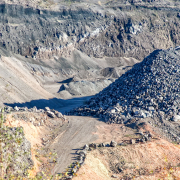CRMs Report: EuRIC Rejects the Creation of Secondary Strategic Raw Materials List, Proposes Solutions for a Green Steel Industry
Last week, the Parliament approved the ITRE committee’s report on Critical Raw Materials (CRMs), a guide for forthcoming trialogue negotiations with the Council. While EuRIC acknowledges and applauds the report’s focus on circularity, concerns arise over biased proposals lacking scientific evidence and causing further, unnecessary bureaucracy.
EuRIC’s position remains steadfast: to mitigate the risks associated with the availability of CRMs, any classification of strategic raw materials must be based on irrefutable scientific evidence and adhere to a meticulous methodology. The recent last-minute endorsement for the formation of a secondary list of strategic raw materials (SRMs), with ferrous scrap quoted as example, raises several questions. Not only could this be seen as outside the scope of the Commission’s proposal, but the inclusion of ferrous scrap without sufficient data sets an alarming precedent for the unrestricted addition of materials to the list, lacking clear conditions or a methodology for assessment.
Consistent data over the years demonstrates that steel faces no supply risk issues; it is abundant, enabling Europe’s recycling industry to meet and even exceed steel demand. In addition, both CRM and SRM lists maintain a neutral stance concerning the origin, – be it extracted or recycled-, of the materials. They are exclusively based on objective criteria designed to evaluate supply risks for European value chains. This impartial approach must be upheld in order not to dilute the very objectives of the CRM Act. No facts support the inclusion of ferrous scrap within the CRM Act.
“We need a robust and evidence-based framework for classifying strategic raw materials and not the creation of countless lists that are biased and devoid of substantial value addition. Creating a list of secondary strategic raw materials, which will include ferrous scrap, raises concerns, and detracts from the proposal’s purpose. Let’s prioritise sustainability and climateneutrality in steel production by increasing recycled content, ensuring precision, rather than dilution of the very purpose of the CRM Act”, said Emmanuel Katrakis, EuRIC Secretary General.
Acknowledging the Parliament’s drive to green Europe’s industry, EuRIC instead proposes databacked solutions to decarbonise the steel industry and enhance transparency and efficiency in the EU’s raw materials list:
- Recognition of Environmental Benefits: Acknowledge and incentivise the environmental advantages of using recycled steel scrap in steelmaking.
- Promotion of Electric Arc Furnace (EAF) Technology: Encourage the growth of EAF plants in Europe, to match the steel production levels seen in Turkey or the US, to boost the steel
industry’s decarbonization efforts. - Optimisation of Scrap Collection and Processing: Support the scrap recycling industry in further optimising collection, sorting, and processing of waste containing steel, to ensure
an even level playing field in the EU. - Addressing Energy Challenges: Resolve the persistent electricity crisis by ensuring abundant, green, and affordable energy – a prerequisite for sustainable industrial investments for both the European recycling industry and energy-intensive industries.
Source: EuRIC (Brussels, September 20, 2023)




